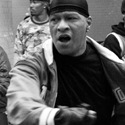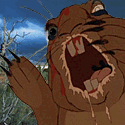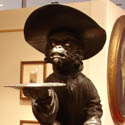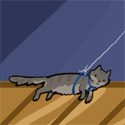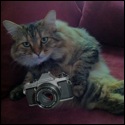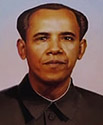|
Ration posted:How do you get passed your biggest hurdles? Look at images constantly, you have to build visual literacy in the same way you learn to read text. Learning to talk about images is a skill you have to learn, just like shooting or composition or editing. Both of those things are extremely important and they are skills that take time to develop. Just constantly be looking at, reading about, and thinking about images. Read about photographers and their work, learn about the context that surrounds it because nothing is created in a vacuum. Try picking up a photo history book, the more you know about what has already happened the more you can understand what's going on now. All images are a combination of craft and content, both are equally important. Don't worry so much about learning the technical stuff, because that is just a means to an end. Let your craft follow your ideas. What you like personally is subjective, but that is a separate issue from whether an image is successful or not. Work you don't personally like can be still be good, valid, successful, important, relevant, etc. And I keep saying, but if you ever come across a reference to a photographer and don't "get" it try looking them up on American Suburb X and read about them. edit: \/ thanks brad industry fucked around with this message at 19:56 on Mar 16, 2010 |
|
|
|

|
| # ? May 15, 2024 19:50 |
|
The http://www.americansuburbx.com/ link needs a wwww. The non-www. just leads to a squatter page.
|
|
|
|
brad industry posted:Look at images constantly, you have to build visual literacy in the same way you learn to read text. Piffle. Just buy a better camera. And lenses. Filters. New tripod. More lenses. New version of camera. Continue until you feel that your pictures are good enough.
|
|
|
|
I started by learning the technical stuff first, and then figuring out the aesthetic part as I went along. It's not so much a series of hurdles as it is a gradual climb with a few "holy poo poo I just realized this!" you come to on your own along the way. There's no magic formula or advice that instantly causes good photography or complete understanding of why others like certain images.torgeaux posted:Piffle. Just buy a better camera. And lenses. Filters. New tripod. More lenses. New version of camera. Continue until you feel that your pictures are good enough. That could be a dangerous suggestion if he's ever been to Fred Miranda. 
|
|
|
|
TheFuglyStik posted:I started by learning the technical stuff first, and then figuring out the aesthetic part as I went along. It's not so much a series of hurdles as it is a gradual climb with a few "holy poo poo I just realized this!" you come to on your own along the way. There's no magic formula or advice that instantly causes good photography or complete understanding of why others like certain images. Yeah, it's always possible someone won't see the satirical nature. It was more for brad than for the newbie, but yes, I was kidding. God, that comment could go straight to FM forums without edit.
|
|
|
|
torgeaux posted:Yeah, it's always possible someone won't see the satirical nature. It was more for brad than for the newbie, but yes, I was kidding. God, that comment could go straight to FM forums without edit. Clearly you haven't spent enough time on the POTN gear forums.
|
|
|
|
brad industry posted:And I keep saying, but if you ever come across a reference to a photographer and don't "get" it try looking them up on American Suburb X and read about them. Oh. Wow. I love reading stories and interviews from the 'old school' photographers themselves as a lot of that era of work I find extremely interesting but very difficult to grasp. This is going to keep me occupied for quite some time.
|
|
|
|
I think I'm going to have to limit myself to a 512mb card when I go out shooting next time. I have this severe problem with overshooting any event I go to, and I end up with 500 pictures of a choir concert which I then have to go through and weed out. The problem is though I get 30 images of the same subject with little discernible differences, and it becomes such a daunting task to even sort through hundreds of images and then by that time post processing is out of the question. How do I get out of the cycle of overshooting and now that I've got 10's of gigs of worthless images how do I go about sorting them out without getting discouraged? (Canon 40D, and I've been shooting jpg+raw like an idiot) Edit: I'm going through a choir concert now and oh god shooting at 3200 was such an awful horrible idea. The noise. Rontalvos fucked around with this message at 04:34 on Mar 17, 2010 |
|
|
|
Rontalvos posted:I think I'm going to have to limit myself to a 512mb card when I go out shooting next time. I have this severe problem with overshooting any event I go to, and I end up with 500 pictures of a choir concert which I then have to go through and weed out. The problem is though I get 30 images of the same subject with little discernible differences, and it becomes such a daunting task to even sort through hundreds of images and then by that time post processing is out of the question. Put it in single mode instead of continuous? Shoot only in manual focus? Every time you go to take a shot, take a breath and think "what makes this photo interesting" before pressing the release?
|
|
|
|
torgeaux posted:Yeah, it's always possible someone won't see the satirical nature. It was more for brad than for the newbie, but yes, I was kidding. God, that comment could go straight to FM forums without edit. I understood the sarcasm.  Thank you everyone for the advice. After looking through some photo blogs, I think that it is helping. It may not be a huge amount, but I have found some work that really piques my interest.
|
|
|
|
Rontalvos posted:How do I get out of the cycle of overshooting and now that I've got 10's of gigs of worthless images how do I go about sorting them out without getting discouraged? Every time you press the shutter, think about what makes what you're about to capture a good image. Before you take another picture, think about what's different between the two. Soon you'll start anticipating shots you want before they happen, and wait for the right moment, instead of motordriving yourself to insanity hoping you accidentally make a good image.
|
|
|
|
Rontalvos posted:I think I'm going to have to limit myself to a 512mb card when I go out shooting next time. I have this severe problem with overshooting any event I go to, and I end up with 500 pictures of a choir concert which I then have to go through and weed out. The problem is though I get 30 images of the same subject with little discernible differences, and it becomes such a daunting task to even sort through hundreds of images and then by that time post processing is out of the question. Of course, once you merge the worlds, machine gun shutters will only be used as insurance. see this [this thread for more information. You can also try to turn off continuous shooting so you have to actually push the button each time. Also try relocating your AF button to the back of the camera. Speedbumps
|
|
|
|
I've also asked this in the Photo Business thread, but I might as well ask here just in case someone has a different opinion. Does anyone have any experience with independently published photo books? Did you meet with any success? There's a variety of new book makers offering all sorts of services not only to photographers, but independent authors in general. ( Blurb, Lulu, CreateSpace, etc ) I'd like to know the general opinion of the above as well as any possible alternatives.
|
|
|
|
Billy Hunt Photography: 4 Tips for Looking Beautiful in Photos http://www.youtube.com/watch?v=CFsD7ddmU6Y
|
|
|
|
jackpot posted:Billy Hunt Photography: 4 Tips for Looking Beautiful in Photos I want him to be my photographer from now on. As long as this was self-aware.
|
|
|
|
Nah, I'm pretty sure it was 100% serious. *throws camera*
|
|
|
|
Billy Hunt phogotgaphyyyyyyyyyyyy... bahahah that was threat.
|
|
|
|
I'm getting ready to go for some long hikes, taking several cameras with me. I have a basic Bogen/Manfrotto tripod, and I honestly have no idea how to carry it on my full size pack. I tried putting it where the sleeping bag/roll goes down on the bottom, but it just slides around. Has anyone run into this before? Thanks!
|
|
|
|
hybr1d posted:I'm getting ready to go for some long hikes, taking several cameras with me. I have a basic Bogen/Manfrotto tripod, and I honestly have no idea how to carry it on my full size pack. I tried putting it where the sleeping bag/roll goes down on the bottom, but it just slides around. Has anyone run into this before? External or internal frame pack?
|
|
|
|
hybr1d posted:I'm getting ready to go for some long hikes, taking several cameras with me. I have a basic Bogen/Manfrotto tripod, and I honestly have no idea how to carry it on my full size pack. I tried putting it where the sleeping bag/roll goes down on the bottom, but it just slides around. Has anyone run into this before? It is an external frame? You could try strapping it vertically to that. Or alternately just attach it to the side somehow -- I've found that vertical just works better in general.
|
|
|
|
Internal frame. This one, specifically: http://www.rei.com/product/762485 I'm looking for a way to mount it to the side, and it looks like I may need recommendations on bungee or other cables to keep it secure.
|
|
|
|
If the broken down tripod isn't too much longer than the pack is wide, you might try attaching it under the top part of the pack that disconnects. If it's significantly longer than that and must be attached vertically, could you sacrifice one of the external water bottle pockets, stick one in end that and the other end through the strap a foot or two above it?
|
|
|
|
BobTheCow posted:If the broken down tripod isn't too much longer than the pack is wide, you might try attaching it under the top part of the pack that disconnects. If it's significantly longer than that and must be attached vertically, could you sacrifice one of the external water bottle pockets, stick one in end that and the other end through the strap a foot or two above it? I am trying the water bottle pocket trick now. I am now looking for something to thicken the tripod around the side, because the upper strap doesn't tighten enough to hold it in place. Overall I think this will work ok- thank you. I love some aspects of gear, but really, it seems like there would be some part or widget to make this go away. It probably doesn't help that I'm trying to take a base model tripod with me either.
|
|
|
|
jackpot posted:Billy Hunt Photography: 4 Tips for Looking Beautiful in Photos Jesus... I thought that was a College Humor video at the beginning. Still watching. More details to come later (maybe).
|
|
|
|
I always strap it to the side by feeding one leg through the side strap and putting all 3 legs in the water bottle pocket while tightening the side strap as much as possible then. I try to balance it out weight-wise by having a big water bottle on the other side. Backpacking and dslrs are not very compatible unfortunately.
|
|
|
|
There are lots of words here, sorry. But i'm in need of a bit of advice. I'm passionate about photography, but unsure as to what my next step about it should be. I'm 23, and all i have is my AA from going to community college for two years. I'd love to get my BA in photography. However, looking at a lot of schools (art schools mainly), their programs seem structured in a way that i'd have to go four years regardless of my AA due to their foundation years and etc. I really am not interested in going for another four years of school, nor could i really afford it anyway. I'd be interested in going to a school requiring only two more years (state schools?), but i'm having trouble finding good ones around my area. I really want to be within about three hours of my current location, Wilkes-Barre, PA - about two hours from Philadelphia. I have a lot of problems with some schools i've researched so far. Lots of problems stem from my not being able to draw which a lot of schools require in their portfolios. UArts would be an awesome school, but i worry it's hard to get into, and i'd have to do four years. I looked at Temple, but got the exact same feeling. I applied to a school called Marywood University, but got rejected. Antonelli Institute seems cool, but they only have a two year certificate; no degree. Pennsylvania College of Art and Design seems like another place requiring four years and drawing in the portfolio. I don't know how long Art Institute would take to complete, but i've heard they have a diploma mill feeling to them. Penn State has a campus with photography, but it's bordering on too far away. So, i have lots of questions. Should i even bother going to school? Should i just assist and forget school? I know there's a big debate of school vs. assisting. Should i just go for four years and deal with being old when i first get out? Are there any other good schools around? And, how intensely do they look at drawing in portfolios of people who can't draw for poo poo?
|
|
|
|
Nausea posted:There are lots of words here, sorry. But i'm in need of a bit of advice.
|
|
|
|
^^^This is good advice, classes on marketing are valuable too!^^^ Well personally I never went to school for photography and I make a living at it. My wife did get her AA and while she makes a living at it too, she doesn't make any more money off it than I do, and I don't think it has really helped business all the much. On the other hand we do weddings and portrait photography together, and I do sports on the side. If you're planning to be a staff photographer for a magazine or something, firstly good luck, and secondly your schooling will probably be necessary for such a thing. So I think the question is what do you hope to get out of photography?
|
|
|
|
Yeah, sorry - forgot to mention that important part. I'm mainly interested in photojournalism, documentary photography, and art photography. My ideal outcome would be working somewhere in realm of magazines, organizations, newspapers (haha), or the art world. I could see myself teaching in twenty years or something though, which adds another need for schooling. I know business is important, but how much so if you aren't really aiming for commercial photography?
|
|
|
|
It sounds like he's chasing the dream of doing something you love as your job. For some it works, others not so much. In my opinion you should forgo schooling in photography and hone your business/marketing skills, assuming you want to make your wages off of it. If not, then just keep shooting and assist where you can. Put that money into some gear, travel, photo books by others. Don't waste your time with schooling unless you're really clueless about how things work and are not good with DIY learning projects. Edit: what you've listed are professions where a strong portfolio and willingness to do a lot of shooting is paramount to a piece of paper. Although you've listed "organizations", what the hell does that mean? Oh did you mean work for hire? Editorial? Commercial? Regardless, "commercial" photographers aren't the only photographers that need to market themselves. Just my two cents. Edit 2: if you want to teach, you have to get a degree in something else, but not photography. I think it's like a teaching degree (can't think of the name of it off the top of my head). germskr fucked around with this message at 17:42 on Mar 23, 2010 |
|
|
|
Nausea posted:Yeah, sorry - forgot to mention that important part. You can go out and build an amazing portfolio doing this right away, without any kind of schooling. But its alot easier said than done.
|
|
|
|
germskr posted:Edit 2: if you want to teach, you have to get a degree in something else, but not photography. I think it's like a teaching degree (can't think of the name of it off the top of my head). In the U.S. you can teach with a 4 year degree and a teaching certificate. It isn't necessary to have a degree in Education. In fact, the degree in Education would only really qualify you to be a school administrator or Education professor.
|
|
|
|
I understand why people say "study business, not photography" but in my experience most of the business stuff was really easy to pick up from books and talking to people. It was not especially complicated to learn on my own and most of it was common sense. There is also a huge support structure through organizations like APA/ASMP/EP to learn those things - here in SF there is usually at least one photo business lecture every week, most free if you are a member of those groups. Without art school though I am not sure how I would have learned a lot of things that I think are more critical to being some kind of working artist. To me personally the big things I got out of my BFA were: learning to talk about images, getting in the habit of structuring your life around making work every day, and being able to honestly evaluate my own work. Those are all things I think are extremely hard/bordering on impossible to learn on your own (not that you have to learn them in school, I just don't see how you could do it by yourself). Most of the older, veteran photo assistants I've met or worked with were people who went to school for something other than photography. They are all super technically proficient, but usually lack maturity in their work - or the ability to recognize immaturity in their work - and can't get past it. Take that for what you will. When people say "running a business is hard" in relation to photography I think what they really mean is "freelancing is hard" because freelancing is what you will be doing. ie: Wooten posted:a staff photographer for a magazine Freelancing takes a certain kind of mindset and a different set of priorities than working a 'normal' job. I think really the thing to consider is if that is what you want. I love freelancing, but I know people who are not cut out for it, people who do it but hate it, and people who want to do it but have a lifestyle incompatible with it. I think if you are not willing to commit to a 4 year art school for whatever reason then just diving straight into assisting is the probably best way to go. At least then you will learn pretty quick whether you really want to be a freelancer in the photo industry or not. brad industry fucked around with this message at 21:46 on Mar 23, 2010 |
|
|
|
What's the best tone of language to use when cold emailing photographers asking if they require an assistant?
|
|
|
|
Tincans posted:What's the best tone of language to use when cold emailing photographers asking if they require an assistant? Respectful, knowledgeable and enthusiastic. Clear, straightforward writing is better than trying to use over-the-top art-critique kind of language and flowery terms. You don't want to sound like a total suck-up (well, maybe some people want that) but it helps if you know something about their work -- awards, shows, etc.
|
|
|
|
orange lime posted:but it helps if you know something about their work -- awards, shows, etc. This is the biggest key to getting a response from any cold form of communication. Doesn't matter if it's cold calling for freelance work or the relevant email inquiries. It shows you're motivated and that you're not just shotgunning every possible lead. People love to be paid attention to, even if it's something subtle like this.
|
|
|
|
brad industry posted:I understand why people say "study business, not photography" but in my experience most of the business stuff was really easy to pick up from books and talking to people. It was not especially complicated to learn on my own and most of it was common sense. There is also a huge support structure through organizations like APA/ASMP/EP to learn those things - here in SF there is usually at least one photo business lecture every week, most free if you are a member of those groups. I agree with brad on all of this. As someone who got an art education, it is infurating working with anyone creatively who hasn't, because it's almost impossible to "speak" art if you haven't had the education. I'm not talking about hoity-toity modern art "you just don't understand" but just being able to know that critiques are not attacks, recognizing a person's artistic intentions and helping them along that path instead of fighting them to adhere to yours, recognizing how to match a person's vision if they are in charge, etc. A BFA is a good thing, just don't go into crazy debt to get it. I'd agree with brad that the business part is easier than the art part.
|
|
|
|
I've been checking in to art classes at the local community colleges and I'm not sure where the concept of "affordable college level courses" came from, but it wasn't here. Are there actually alternatives for learning to speak art?
|
|
|
|
squidflakes posted:Are there actually alternatives for learning to speak art? Learning to speak bullshit.
|
|
|
|

|
| # ? May 15, 2024 19:50 |
|
squidflakes posted:
Yes just learn it yourself, talk art with artists, read alot, "getting it" isn't some holy grail that you can only obtain through art school.
|
|
|










